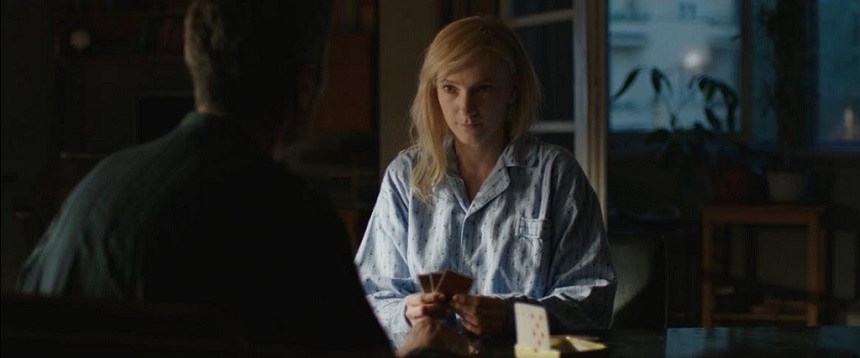Berlinale 2017 Review: ON BODY AND SOUL, One Of Those Films That Makes You See Afresh

Whether White God or Son of Saul, there are some seriously good films coming out of Hungary at the moment, and Ildikó Enyedi's On Body and Soul is no exception. Sitting in the 67th Berlinale's Main Competition, this often almost mystical drama is not necessarily unlike anything you've ever seen before, but it's charming and witty in a way that is definitely hard to resist (even at 9am on a typically freezing Berlin winter morning).
As a film, it tells a rather sweet love story between two odd, but lovable individuals named Endre and Mária. They begin as strangers working in an abattoir - or even worse as suspicious adversaries, as Mária enters as a new quality inspector who could cause director Endre trouble. What changes it all is a psychological test which drives them both to realise that they are sharing the same dream, and they are not as alone as they both thought.
What emerges is a captivating possibility for human communion in a tale full of tragi-comic existentialism. But even before On Body and Soul fades in, it's already clearly hitting you with its unusual tone. A strange metallic music rings out in the darkness, not unlike the ethereal sound of a Terre Handpan, and its effect is hypnotic and mood-altering. Suddenly we are transported to a stunning Hungarian winter wonderland: all around us are slender trees, and a blanket of white snow thinly covers the ground.
Through this breath-taking scene stalks two deer, caught in a kind of intimate tranquillity that is almost hard to believe. One is a skittish doe and the other is a proud stag whose white-tipped, horns bear the delicate weight of a layer of snow. Both look wet and bedraggled, but somehow Enyedi captures their movements and emotions in a manner that feels unmistakably touching and human as the two creatures reassure and respond to each other.
Just as suddenly, and with a very dream-like logic, the scene then switches to an abattoir (of all places!) and we witness cows being herded to their death by the factory's workers. The gory shift between the two scenes is stark, and definitely not for the faint hearted. But then, for perhaps the whole first hour of the film, Enyedi lingers on the features of these employees in a manner which seems almost misanthropic.
She dissects their bodies in close ups, just as they viscerally carve up the cows, and she hones in on their features in a way that often seems odd and unpleasant. Yet at the same time, the film hammers home a very moving sense of the interconnectedness that exists between everything in its world. The bathing sun that the cows languidly enjoy is the same magestic sun that we see our lovers enjoying.
Nevertheless, this too is always done with a very bodily strangeness, as Mária neurotically keeps her toes out of direct sunlight and Endre stands there with one paralysed, thin arm dangling by his side. Through fleeting details, mixed with the sometimes very head-on scenes of animal slaughter, On Body and Soul creates an impression of physical unpleasance that is quite truly spell-binding. Yet it still somehow gives a sense of all these horrors of human reality almost as if always through a shy, sideways glance.
Stylistically, this rather reflects the furtive gazes which the two protagonists continuously exchange as they form a new (and often unconventional) working relationship. This is particularly true of the often exceptional performance that Alexandra Borbély puts in as the obsessive-compulsive Mária. And it is often exactly her kind of general obsessive cleanliness or compulsive clinicalness which gives this film its true horror.
The verbal exchanges between these two characters, as they pass around the factory, are also often so absurd and tense they seem not unlike something from a Yorgos Latimos film. What's more, it's all told at a very measured and familiar kind of art-house pace; but the way shots are selected or framed really makes you see the world as if from a completely fresh perspective, even if it is often using techniques which have been used many times before.
For example, we will often see Mária's face as if it were a mirage in a shiny, reflective door, or see half of her face blotted out altogether by a large metal bar. It all feels edgy and cagey, and the film first and foremost becomes about a sense of modern alienation, or mores specifically about the sensation of isolation and disconnectedness from others in our modern lives.
As such, On Body and Soul becomes a really refreshing discussion of modern anomie and the almost spiritual shared feelings that can still save us from feeling lonely. But it is never at all heavy or moralistic in tone. The characters are always so intricately drawn out by Enyedi and her cast, and they always feel so clearly defined or full of personality that you never feel weighed down by the film's heavy thoughts (even rather remarkably during an attempted suicide).
What emerges instead is a really delightfully different piece of filmmaking, which you feel doesn't necessarily force anything upon you. Instead, it just appeals to a child-like inner part of you and concentrates on making you resensitised to certain kinds of feelings, whether that be longing, hope or despair. It's a very promising start to this year's festival.







